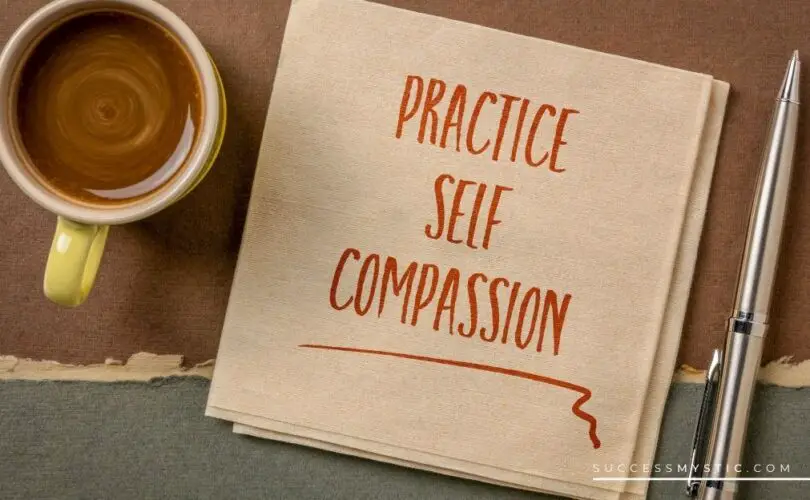If you want to become happier, feel more confident, and improve your self-esteem, then learning to be more compassionate toward yourself is crucial. Some people believe that having high self-esteem is most important to your overall happiness and enjoyment of life, but, in fact, having self-compassion is even more critical.
Here, we will explore what it means to be self-compassionate, including debunking some common myths about this construct. We share some of the many benefits you will experience when you learn to practice self-compassion, and we will help you identify whether or not you feel compassionate toward yourself. Finally, we will share with you some ways to build your self-compassion so that you can work toward enjoying more happiness and a better you.
What Is Self-Compassion?
Being compassionate toward yourself is no different than expressing compassion toward someone else. When someone is struggling or hurting, you empathize with how they are feeling, you are moved by their plight, and you offer comfort and support. This should be the same reaction you have toward yourself when things are not going so well.
Unfortunately, many of us do not treat ourselves with a lot of compassion. Instead, we feel like we need to be tough, to stick it out through hard times, and that we are someone who does not deserve to feel hurt by disappointment or loss. There is a pervasive notion in our society that toughness is better than compassion, unfortunately.
Compassion, whether it is for oneself or for someone else, occurs when first you notice suffering and then becoming moved by the pain being experienced. You then offer support, understanding, and kindness to the sufferer without judgment. Also, compassion also helps you see that suffering, pain, and imperfection are part of what it means to be human; it is a part of life with which we must all learn to live.
When you are compassionate toward yourself in the same way as you would be toward others, you acknowledge that life is challenging you right now, and you seek ways to care for and comfort yourself while you process your experience.
Why Self-Compassion Is Beneficial
While the ultimate goal of any personal development or growth is to enhance your happiness and satisfaction in life, to be a better you, this is only carried out when you care about yourself. When you have self-compassion, you honor and accept that you are human, you have needs, and your needs deserve attention.
Learning to be self-compassionate can bring you many advantages and benefits to your life, among which is more happiness. Here are just a few of the many ways that becoming more compassionate toward yourself can help you become a better you.
You Learn To Stop Judging Yourself
Those who have self-compassion can understand and think warmly towards themselves when they have failed, feel inadequate, or are suffering. When you are self-compassionate, you reject the notion that ignoring your pain is healthy or strong. You resist the urge to criticize yourself and instead recognize that we are all imperfect creatures. We are each experiencing life as it comes and doing our best to make the right choices. And sometimes, we stumble.
Lacking self-compassion means you spend time getting angry about or regretting your mistakes in life or criticizing yourself for missteps. Self-compassion allows you to treat yourself with kindness and gentleness when you are hurting, rather than judging and treating yourself negatively when you are already down.
You Connect With Others
Learning self-compassion also means recognizing and accepting that mistakes and failure are a part of life, something we all experience. You are not unique in your suffering, and once you see this, you can empathize and connect with others better when they are suffering, as well. Becoming self-compassionate means, you understand that your situation is meaningful for you but does not make you unique.
You Become More Mindful Of Your Emotions
When you practice self-compassion, you learn to become more mindful of your emotions. This allows you to accept how you are feeling rather than blow your experiences out of proportion or suppress them unhealthily.
You are better able to place your feelings into the context of the bigger picture, and you can more objectively see your negative emotions with clarity and awareness. You learn to be less judgmental of your feelings, and you are aware of how these influence your physical, mental, and emotional health.
You Increase Your Focus And Ability To Care For Others
Research (A wandering mind is a less caring mind: Daily experience sampling during compassion meditation training; Hooria, et al)into compassion meditation and other forms of mindfulness training associated with developing self-compassion have demonstrated that regular use of these types of activities enhances your ability to focus as well as care for others.
Typically, our minds wander off topic about half the time, but for those who practice regular compassion medication, that percentage is reduced. When your mind focused more, you are able to show more caring behaviors toward others as well as yourself.
In addition to helping your mind remain focused, this type of training also helps you stay focused on more positive topics and increases your incidence of positive behaviors toward yourself and others.
You Learn To Take Better Care Of Yourself
Cultivating self-compassion can reduce the incidence of destructive or self-sabotaging behaviors in some people. In recent research(Self-compassion training for binge eating disorder: a pilot randomized controlled trial; Kelly, et al) those with eating disorders who learned self-compassion techniques and exercises saw improvement in their disordered eating and unhealthy behaviors
When you learn to feel compassionate toward yourself, you repair negative body image issues, heal wounds that have led to substance abuse or other problems, and teach yourself to take better care of your body, mind, and soul.
Three Myths Of Self-Compassion
Now that we understand what self-compassion is, it is also helpful to understand what it is NOT. The construct of self-compassion sometimes gets conflated with ideas, and it also can be used as a scapegoat for some types of negative behavior. So, let’s dispel the myths some people seem to hold onto about self-compassion.
Myth: Self-Compassion is the Same as Self-Esteem
While self-compassion and self-esteem may seem similar, they are actually quite different in meaningful ways. While self-esteem is how we value or judge ourselves, how much we “like” ourselves, self-compassion is not based on any self-evaluation.
And some efforts to improve self-esteem can, unfortunately, have negative consequences. When trying to enhance your self-esteem, you may resort to negative behaviors such as becoming aggressive or competitive, becoming self-absorbed, or comparing yourself to other people.
Instead, when you focus on building self-compassion, it does not matter if you are at your best or worst. You embrace yourself, no matter your current condition, with kindness and love, which creates more emotional balance in the long run. You can see yourself clearly and be compassionate without worrying about whether your “good” enough.
Myth: Self-Compassion Means Being Self-Indulgent
Some people believe that self-compassion is about letting themselves “get away” with something in order to feel better. For example, if you have experienced a major disappointment, you may think that being self-compassionate means you allow yourself to stay in bed all day, eat junk food, and indulge in your sad feelings. This is self-indulgence, not self-compassion.
Self-compassion is about being healthy and happy in the long-term, big picture. It is about caring about your lasting happiness more than how you feel right now. Genuinely caring for yourself requires some positive self-parenting, particularly in the tough moments, and doing what is best for you in the future, not indulging your whims today.
Myth: Self-Compassion is Self-Pity
Self-pity is also often confused for self-compassion, but the two could not be more different. One of the hallmarks of self-pity is immersing yourself in your own problems. This also means you are forgetting that others have had similar issues and that you are part of the shared human condition.
Ignoring these interconnections and focusing instead only on your needs is not compassionate. It is egocentric. This feeling makes you exaggerate your own feelings or make you feel self-important because of your hurt.
Being self-compassionate helps you see how you are not isolated or disconnected, which gives you a more balanced perspective on your experience. You can see the broader picture and place your experiences in the context of being human.
Your Turn: How Self-Compassionate Are You
So, how compassionate are you toward yourself? Not sure? Read each of the following questions. Write down your answers for each, then reflect upon your answers.
Examine how often you are paying attention to and caring for yourself in times of need.
- How judgmental are you about your own weaknesses or flaws? How often do you disapprove of your own actions or choices?
- Do you fixate on what is wrong in your life frequently?
- How easily are you able to see that your pain is similar to what others have gone through in their lives? Or do you feel like your suffering is unique?
- Does thinking about your weaknesses make you feel similar to or different than others?
- When you are in emotional pain, how do you react to yourself?
- How often do you consider how others in the world are suffering or hurting, like you?
- How do you handle strong emotions? What is your normal response?
- How tolerant are you about your weaknesses?
- What are some self-care behaviors you use when you are upset?
- Do you think others are happier than you?
- How do you handle failure or disappointment? What has happened in the past when you have experienced these emotions?
- Do you think other people’s lives are easier than yours?
- Think about a time you were kind to yourself. What prompted these behaviors? What was the result?
- How do you react toward others when they upset you?
- What strategies do you use to balance your emotions?
- When was a time you were particularly hard on yourself? What happened to trigger this response?
Reflecting on how you answered these questions can supply valuable insight into your current state of self-compassion. There are many online self-assessment tools available, as well, to help you determine if you need help in this area.
12 Ways To Develop Self-Compassion
If you have determined that your self-compassion could use a little TLC, it is time to get busy. The following are exercises you can use to raise your self-compassion, to help you name triggers to your self-defeating thoughts, and to raise your mindfulness about your emotions. Select those that work best for you and practice them regularly for best results.
Treat Yourself Like a Friend
The next time you are suffering, ask yourself- If my best friend was feeling this way right now, how would I respond? Think about a time when a close friend or loved one was feeling bad about themselves or was struggling. How did you react? What did you say?
Now that you are suffering, you deserve the same treatment. Why should you treat yourself differently than other people? What might change if you treated yourself in the same way you treated your friend? Now’s the time to find out.
Treat Yourself Like a Child
If you can’t connect with or identify with the above exercise, consider this. When you see a small child who is hurting, how do you treat them? How do you comfort and support a little one who needs help dealing with their feelings? Give yourself the same compassion and care you would a child. You deserved to be nurtured and protected, too.
Become More Mindful
A cornerstone of developing self-compassion is becoming more mindful. This not only alerts you to when you are criticizing yourself but also to when your emotions are out of proportion or when you are not caring for yourself. Mindfulness exercises help you to become aware of these feelings and actions but also to stop judging yourself.
There are many different forms of mindfulness meditation and practice. Finding one that works well for you should not be difficult. There are several guided mindfulness exercises available online to help you develop your self-compassion, and some take just a few minutes each day.
It’s Okay. You Are Not Perfect.
When you learn to be compassionate toward yourself, you accept that you are flawed and imperfect, but also that this is entirely normal. Self-compassion provides us room to be human and to stop defining ourselves by our mistakes and weaknesses.
You can allow yourself moments of weakness and vulnerability and still be a good person. The next time you find yourself wanted to disregard your feelings or lacking compassion for yourself, ask yourself why?
Embrace Your Passion
There is something in life that you really love. Whatever gets you excited and ready to get out of bed each day is worth exploring and enjoying to its fullest. Allowing yourself to be passionate about something, whether it is your job, a hobby, your partner, or something else, means you accept this part of you without judgment and allow yourself permission to explore it unabashedly.
Write to Explore Your Self-Compassion
First, think carefully about something that makes you feel inadequate or bad about yourself. Pick one of these to explore further. Write about this issue. What emotions do you experience when you think about this trait? Do not ignore or try to suppress these feelings. Just write them down.
Next, explore what you could say to yourself about this perceived imperfection. What would your best friend say to you about this issue? How can you convey deep compassion for your pain when you judge yourself so harshly? Talk to yourself with unlimited caring and compassion and remind yourself that being flawed is part of being human.
What possible changes could you make to help you address this issue, to raise your confidence and help you feel better? What kinds of support do you need to make this happen? Write it all down, exploring the full extent of your emotions on this issue as you explore its depths.
Return to this exercise later, coming back and rereading what you wrote. Do you hear the compassion in the words? Do you see how comforted you feel knowing you care so deeply about yourself?
Take A Look In The Mirror
Not many of us spend much time looking in the mirror regularly. And if we do, we are often looking for ways to hide our imperfections. When you look in the mirror, what thoughts start running through your head? What internal criticisms start to creep in?
When we look at ourselves, our instinct to be compassionate often quickly goes away. But, when we see and pay close attention to how we respond to ourselves, we can first change those thoughts and second, change how compassionate we treat ourselves.
Start by sitting in front of a well-lit mirror. Relax your face as much as possible, and carefully examine each part of it. Look at all its separate parts, including your hair and ears. Do this without judgment. Simply observe.
When you hear the internal comments, notice them but do not respond to them. When you hear yourself make these comments how does your face react? Do you see tightening or discomfort? Do your eyes change? How do these thoughts make you feel? Release any tension you are holding.
Tell yourself, “I love you.” Repeat it until you have really heard the words. Look into your eyes and say it until you feel the warmth those words should deliver.
Keep A Journal
Writing in your journal is an activity that can help you process the troubling events of your day by examining them with self-compassion. Doing this regularly can enhance your well-being and allow you to become more self-reflective.
Journaling allows you to express your emotions safely. When you sit down each day to write, focus on what happened to you as well as how you felt. How did you judge yourself today? What difficult experiences caused you pain? For each event you discuss, process it with mindfulness, kindness, and by examining your common humanity.
Get Professional Help
Not all of us can develop self-compassion on our own. Sometimes, working with a trained therapist or counselor can bring about better results because they know how to help you change your behavior in productive ways.
Talking with a therapist or mental health professional can help you notice your feelings, gain a realistic perspective about you and other people, and learn how to be empathetic toward yourself. Therapy is an excellent tool for learning to push past negative beliefs and develop more self-compassion.
Motivate Yourself Differently
Many of us use self-criticism to motivate us to change our unhealthy habits. For example, many people are hard on themselves about their weight, thinking that if they do this, they will be motivated to lose the extra pounds. Doing this only causes pain, though, and does not really drive us to make lasting changes.
Instead of using criticism as a motivator, try kindness. How would you cheer on a friend who is trying to make positive life changes? What kind words would a mentor, parent, or teacher use to encourage you to try something different? Think of the most supportive messages you can that can motivate you to be happy and healthy.
When you catch yourself criticizing this aspect of your life, turn to your more positive motivating talk. Reframe how you respond to your inner critic, choosing supportive and encouraging language for yourself. Love for yourself will be the most powerful motivator you can find.
Change Your Self-Talk for Good
This strategy takes some time to fully implement but can make lasting changes to that critical inner voice that is keeping you from feeling compassion for yourself. You can either write this exercise down or practice it as internal dialogue. It is your choice. Find the method that works best for you and stick with that.
First, start by noticing the times when you are self-critical. You may not even notice it because it happens so often. When you start to feel bad about something, think about what you just said to yourself.
- What words do you use?
- What words or phrases do you notice coming up repeatedly in your self-talk? What tone of voice does your inner critic use?
- Does this voice have any similarity with someone in your life, either now or in the past?
- When does this inner voice seem to be the loudest or strongest?
- What types of activities are most likely to spark its speech?
After a few weeks of documenting and looking carefully at the voice, consider how to change what you are hearing into more positive self-talk or how to respond to your inner critic with compassion.
For example, you should not tell yourself to shut up, but instead let your critic know that you understand it is concerned for your health or happiness. Tell that voice how much pain it is causing you. Talk to your inner critic with the same kind of loving compassion you want it to offer to you. Ask for more compassionate suggestions and words in the future.
When your inner critic rears its head next, reframe its observations so that they are more compassionate and helpful. Turn that voice into that of your best friend or most supportive relative. What would they say to you instead?
Make yourself be in charge of this inner dialogue and use the compassionate speech you have already identified as most helpful to point out your behaviors and suggest healthier alternatives.
Responding to your inner critic with compassion can model the positive words and helpful suggestions you want to hear from it in the future. And the more you practice this, the easier it will come more naturally. Do not give up, and you will start to hear that voice change its tune.
Focus On The Human Condition
No matter what you are struggling with right now, no matter the pain or harm you have endured, millions of others around the world have also experienced these same emotions. This is not said to diminish how you are feeling, because to you, it is still painful.
But, recognizing your shared humanity, that each of us makes mistakes and has regrets, can help you feel more connected to others and not so alone in your struggles.
Focusing on the human condition to help you feel like your experiences are normal and part of life, rather than the result of your inherent flaws or because you are unworthy of happiness in life.
Our flaws and setbacks should be what connects us to others, not what divides us or makes us shrink away from the world. Embrace your humanness, learn to accept that your pain is part of being alive and learning, and become more compassionate toward yourself.
Final Thoughts
Learning to become more self-compassionate is the ultimate act of love you can offer to yourself. More important than your overall self-esteem, self-compassion gives you the love and kindness you deserve, when things are going well and when times are more difficult.
Learning to find the reasons for your harsh treatment of yourself is extremely helpful when developing self-compassion. Many of us do not even know where these negative attitudes and behaviors come from or how they even started.
Chances are, you can look back to your earliest influences in life to see where you adopted these notions of how to treat yourself.
Learning self-compassion can help you care for yourself and honor your needs as well as provide you with comfort when you are struggling. Becoming self-compassionate is the key to unlocking your ultimate happiness and becoming the best version of yourself you can possibly be.







